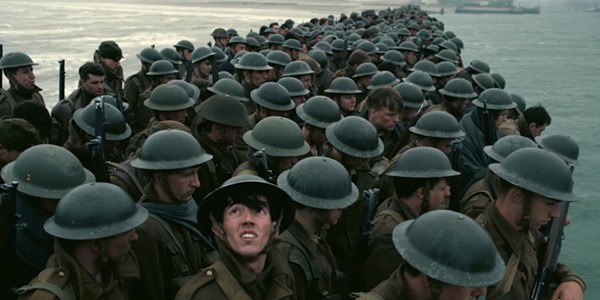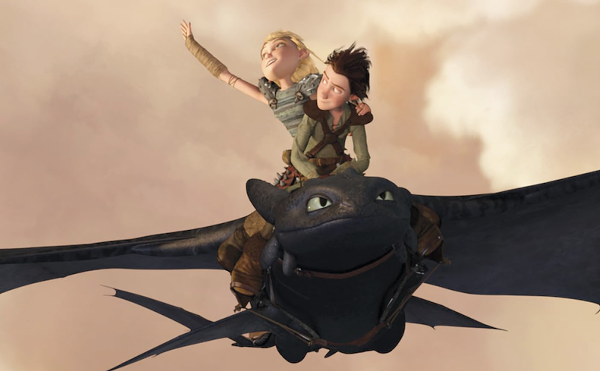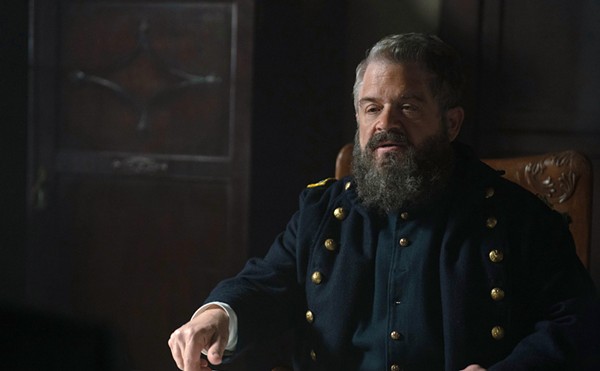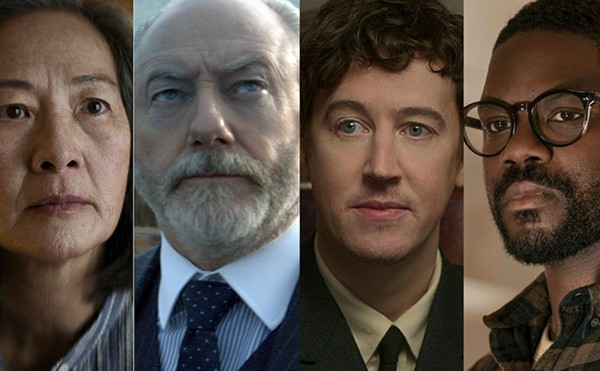Dunkirk is primal. It feels urgent and contemporary even though it is set 77 years ago, outside the memory of the vast majority of people who might see it. And it is a movie about war, an experience that fewer of us today have had. But writer-director Christopher Nolan creates an immediacy to the film by dropping us right into the middle of the chaos with very young British soldier Tommy (Fionn Whitehead), who is waiting on the beach with hundreds of thousands of other men: The Germans have pushed the English troops right up to the water’s edge on the northern French coast. They are stranded, and none of them has any idea what is going to happen to them, their desperation conveyed by little more than the haunted glare in their eyes. Dunkirk opens as practically a silent movie. Because what is there to say? They have been defeated in every way possible short of actually being killed.
And then Nolan brilliantly amps up the confusion and anxiety of the soldiers on the beach in a way that is downright exhilarating, by playing with cinematic time: We have joined Tommy’s story a week before the evacuation of these troops, but we join pleasure-craft sailor Dawson (Mark Rylance) only a day before the evacuation begins, as his small yacht is about to be commandeered by the Royal Navy to sail to France and collect soldiers, and we join Royal Air Force fighter pilots Farrier (Tom Hardy) and Collins (Jack Lowden) a mere hour before, as they take to the air to protect the flotilla of small boats (such as Dawson’s) heading for Dunkirk. The days of waiting for Tommy, the hours on Dawson’s yacht, and the minutes in the air for the pilots gradually converge in time as events reach their climax ... and this ingenious narrative structure spreads the dread and tension throughout the film in a way that a more straightforward narrative could not.
In fact, Dunkirk is so relentlessly suspenseful that it kept me wound tight throughout; there were moments when I realized I was clenching my jaw or tensing my whole body and had to force myself to relax. I actually hurt by the end of the movie. It’s easy to joke about spoilers in a story about a historical event the outcome of which is already known, but none of these fictional characters is guaranteed a happy fate. Dunkirk is wound as tightly as I was: It may range across a wide beach, the breadth of the English Channel, and the wild blue yonder, but it’s intimate, sometimes almost claustrophobic. Nolan never cuts away to politicians and generals making plans in London, for instance. We are stuck in this little bubble of nervous fear.
Eschewing CGI and shooting on the actual locations — including the real Dunkirk beach — with ships and planes of the era (and thousands of real-live extras) certainly contributes to the sense of organic authenticity of the movie. But it’s the smallness of the film that is so important, so vital. This isn’t, after all, a movie about war, about large-scale battle, never mind that it puts us in the middle of a war with a power that few other movies have achieved. Dunkirk is about something of which war-making is only one aspect: It’s about people playing their parts in an enormous communal effort. This is what gives the film its resonance for us today, and what makes it so emotional, even though we barely learn much about any of these characters. The people here are boiled down to one thing, their one intense purpose of the moment, whether that’s their own survival or their absolute imperative to do something to pitch in, as with teenager George (Barry Keoghan), who insists on sailing with Dawson to Dunkirk because he is desperate to help in whatever way he can.
Dunkirk, then, is speaking to a desire that many of us have — to be a part of something big and important, to step up and contribute our effort to something meaningful. We don’t see a lot of opportunity to do that today, and we long for it. (That doesn’t have to mean war! It could mean battling global warming, or rebuilding crumbling infrastructure.) And when we see the power of working together that Dunkirk illustrates, its absence suddenly sting
















